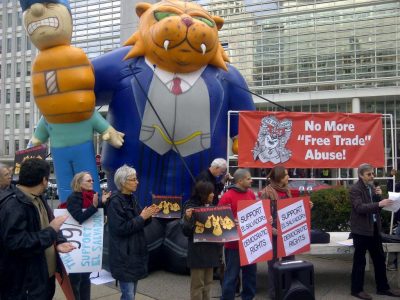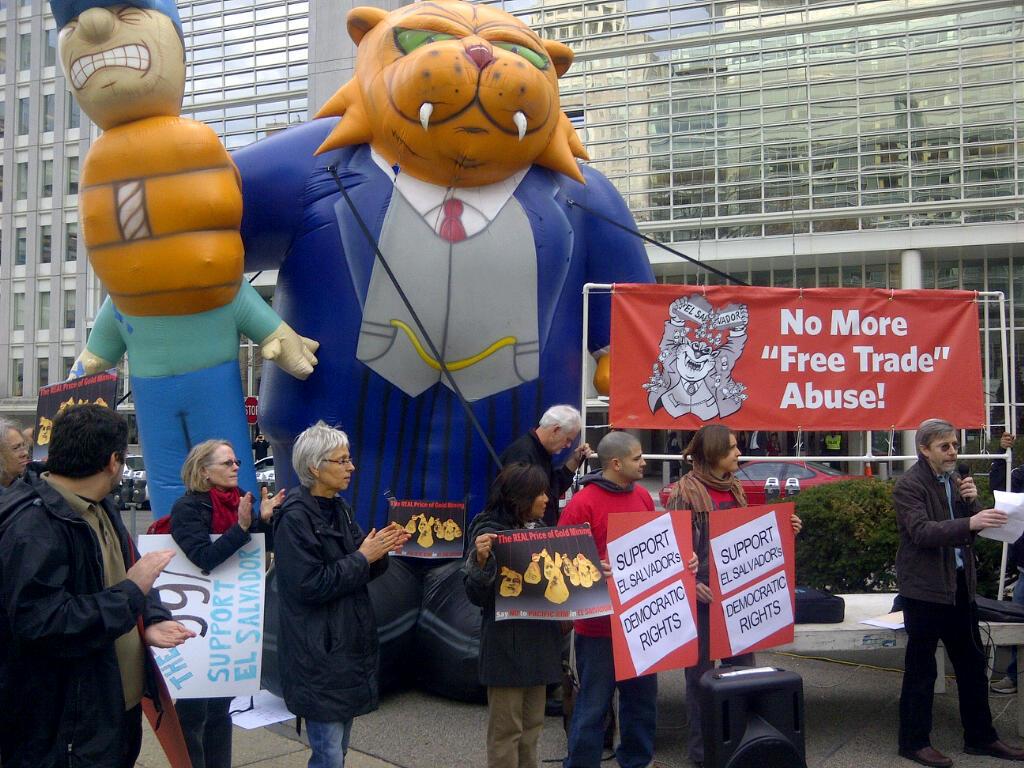By early 2012, a little-known tribunal representing the interests of the 1 percent will likely make a ruling with significant implications for the 99 percent.
The tribunal is called the International Centre for the Settlement of Investment Disputes (ICSID). And, it is located in the giant concrete complex of the World Bank headquarters, which occupies an entire city block in downtown Washington, DC.
Five of us ventured down to the World Bank early in the morning of December 15 with 1,000 copies of a leaflet protesting the tribunal. Bank security guards warned us that we were not allowed to leaflet inside barriers set up in the wake of the huge anti-corporate globalization protests of a decade ago. We asserted our first amendment rights and told the security chief that he would have to call the police if he really wanted us to leave. We were allowed to stay.

A World Bank tribunal might let the Fat Cats trump El Salvador’s democracy. Photo by Ron Carver.
By noon, we had inflated an 18-foot high “fat cat” outside the Bank, courtesy of the Teamsters union. Delegations from several other unions joined with environmentalists, religious activists, Central Americans, and groups in solidarity with the people of Central America. Activists from the Farm Labor Organizing Committee pulled up in a car, having traveled all the way from North Carolina to join us.
Then, at noon, representatives from these groups spoke to the 100 or so gathered and narrated the saga that brought us to the World Bank that December day.
The story began some two decades ago in Washington, when lawyers from the 1 percent that work along the K Street corporate lobbyist corridor just two blocks north of the World Bank got together to craft a set of corporate rights to insert in the North American Free Trade Agreement (NAFTA).
These so-called “investor protections,” now in dozens of U.S. trade and investment treaties, are some of the most outrageous examples of excessive corporate power. In brief, they grant corporations the right to sue governments in international tribunals for compensation over actions—such as laws and regulations—that reduce the future value of corporate investments. While this may sound innocuous, such “protections” allow corporations to sue governments that enact environmental, health, or other measures enacted to protect the public, even when developed through a democratic process. In other words, corporate “rights” trump social, environmental, and democratic rights.
Enter ICSID, an obscure tribunal in the World Bank empowered to rule on these “investor-state” cases. The president of the World Bank chairs the ICSID administrative council, while individual cases are determined by three judges. Those three judges, whom no one elected, can decide the fate of millions.
Our protest concerned a case currently before an ICSID tribunal that will determine the fate of many in El Salvador. A gold mining company, Pacific Rim, is suing that government for compensation because that government did not approve a permit for the company’s gold mining project. The majority of Salvadorans oppose this project because of legitimate concerns that it could poison a river that is the country’s biggest source of drinking water. Through ICSID, Pacific Rim is demanding in excess of $77 million.
The story gets even more outrageous. Pacific Rim is suing under the U.S. trade agreement with Central America and the Dominican Republic, called DR-CAFTA. But since Pacific Rim is based in Canada, and Canada is not a member of the DR-CAFTA pact, Pacific Rim created a subsidiary in Nevada in order to file this lawsuit.
Thus, the protest. The speakers, chants, and Salvadoran music were broadcast live (via a cell phone) on a radio station in the gold region of El Salvador. The youth who run the station have received multiple death threats for their role in spreading the truth about gold mining. In the past two years, four activists working to save their water from mining have been assassinated, including most recently a college student who was disappeared after putting up leaflets against mining.
Back in Washington, in the shadow of both the fat cat and the World Bank, the protest culminated in a delegation of six of us walking to the doors of the World Bank to deliver an open letter to this ICSID tribunal and to the president of the World Bank.
The letter, signed by over 240 labor unions and other organizations representing more than 180 million people, demands that democratic decisions in El Salvador be respected and that the Pacific Rim case be thrown out. The letter demands an end to the trampling of democracy.
We were met at the door by a senior World Bank official surrounded by security guards. He politely took the letter and the signatures, promising to deliver them to key officials, including the three judges who will make this decision. As we walked back through the metal barricades for the last time that day and wondered what impact our protest and petition might have, a woman who works at the Bank approached one of us whispered: “Your protest is all that anyone at the Bank is talking about today.”
For this one day, representatives of the 99 percent were able to step into an arena that serves the 1 percent. It remains to be seen how ICSID will rule.
And, yes, you too can take action to help the people of El Salvador in this struggle.
